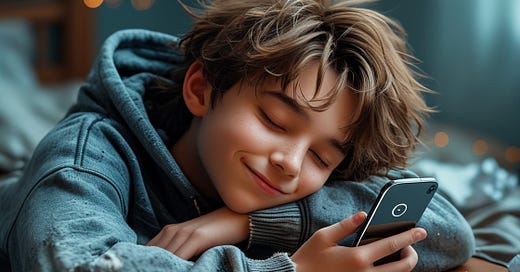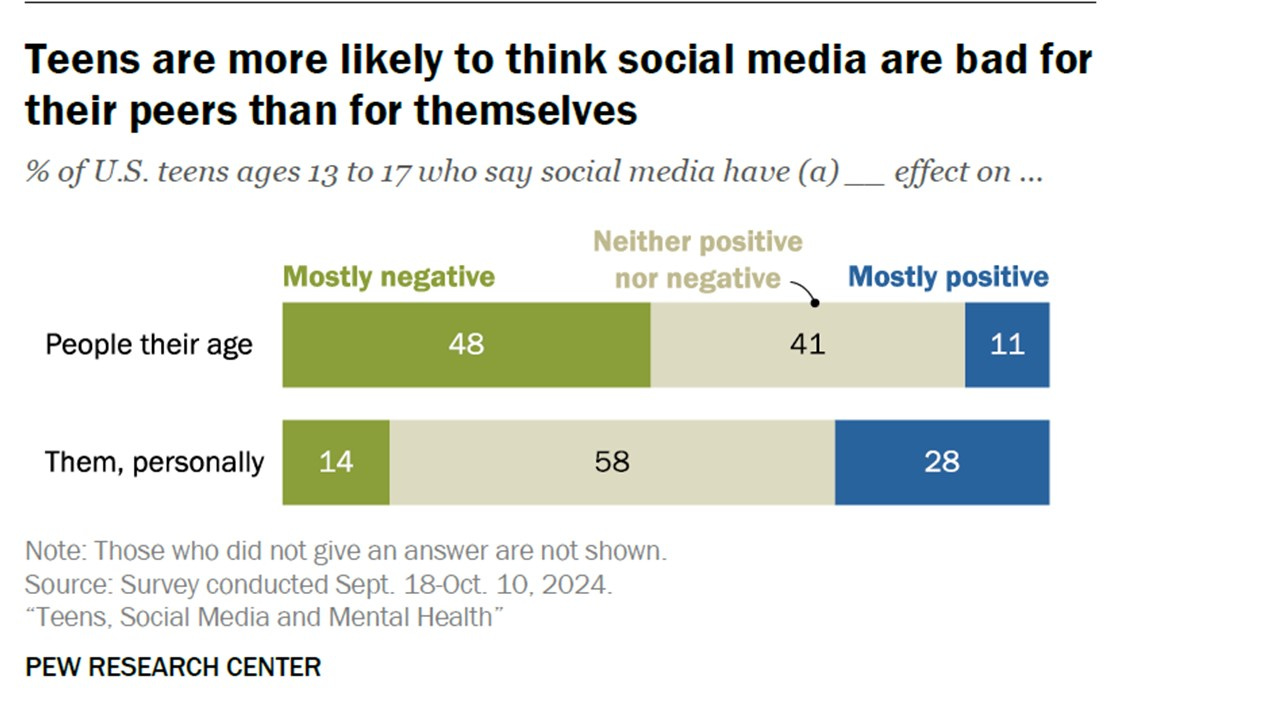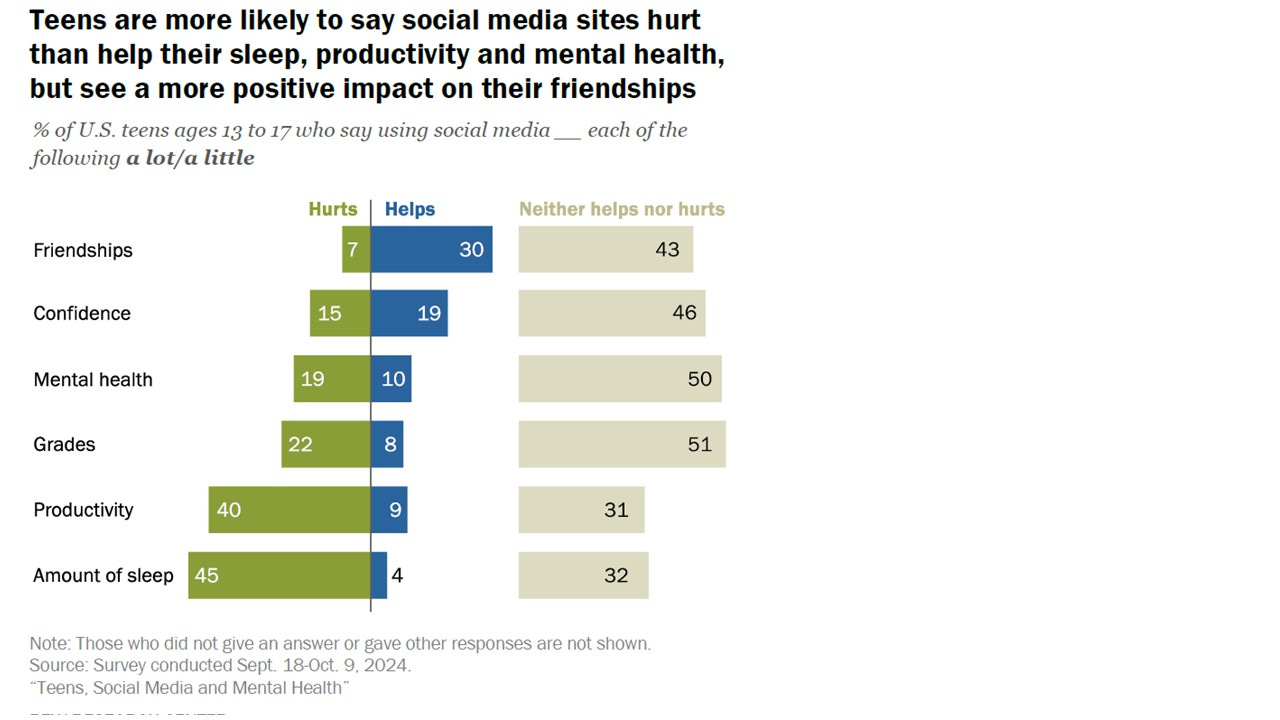Teens Mostly Like Social Media, But Worry About Their Friends and Sleep
A look at the new Pew Research survey
It’s not uncommon to hear advocates for restricting youth access to social media claim that youth themselves want this. It’s hard not to picture some kid doing the stereotypical “Won’t someone please stop me before I kill/social media again!” But a new report from the Pew Research Center finds some nuances in teens’ own opinions.
First, it’s worth noting that the Pew folks do excellent opinion surveys, but they are opinions. So, this current survey, whether the news is good or bad, reflects what youth think is going on, not what actually is going on. That’s still interesting for what it is, but it shouldn’t be mistaken with actual data (as we’ll see in a moment). And teen self-report is notoriously unreliable with a bias toward negative reporting, so there’s also that grain of salt to take with this.
That, out of the way, there are interesting nuances in this data. First, by about a two to one ratio, more teens thought that social media was a positive (28%) than negative (14%) overall impact on their lives, with the vast majority (58%) finding it to be neutral. This suggests that, everything on balance, there isn’t a massive wave of teens wanting to be rescued from social media. Pew themselves sort of deemphasized this finding in their own reporting which is a bit disappointing, but it’s an interesting outcome.
Also interesting is that teens are far more worried about their peers than themselves with 48% thinking social media had a negative impact on other teens. Basically, teens are pointing fingers at each other. This is the famous “third person effect” where people tend to recognize that media has little impact on themselves, but believe it has a strong effect on others. Exactly how to interpret the third-person-effect is itself somewhat controversial. Given a general research base which suggests minimal actual impact for most screens on most behaviors, I suspect it reflects a tendency to correctly identify minimal change in themselves but overestimate the degree of influence on others. Why would people do this? Probably because they keep hearing about it over and over in news media, or, in the case of teens, from their parents and teachers. It’s easy to look internally and see “Well, I haven’t changed”, but all these adults saying this is a thing can’t be wrong, can they? We’ll return to this idea.
Pew then breaks down teens’ responses regarding several issues. They highlight mental health, but I actually find the differences on mental health, confidence and grades to be kind of tepid. The real striking differences are regarding social connections, which teens thought social media helped, and productivity and sleep, which teens thought social media hurt. Overall, girls were more likely to report more negative experiences than were boys.
There are some limitations here…I tried to see how exactly Pew conceptualized “productivity” and got taken to a website full of nonsense about addiction and dopamine, etc., which maybe isn’t the best look for Pew’s own objectivity here. I then realized the survey is at the bottom of their report, and it looks like they simply asked about “how productive you are”. Since I don’t really know what that means, I’m not sure teens would either1. So, I think the big negative finding here is for sleep. Let’s put a pin in that for a moment.
So…to reiterate, teens generally lean toward a positive impression of social media but do worry about impacts on their friends and their own sleep.
One thing that stands out is that Pew notes that the responses from teens are more negative than they were only 2 years prior. This invites us to ask: what has changed in 2 years? There don’t seem to have been a lot of changes in social media itself, or teens’ use of it. What has changed is the steady drumbeat of news media, activists, scared parents and teachers, cellphone bans in schools, etc., all bombarding (ok, now I’m guilty of using that word) teens with negative messages about social media and its supposed impacts. In other words, I suspect teens’ responses here are at least in part driven by the moral panic over social media, which they’re quite aware of.
So now let’s return to the issue of sleep. It’s definitely true that teens have problems with sleep, and these aren’t new. The prime culprit probably is the ridiculously early start time for high schools which is completely out of synch with teens’ sleep patterns. Back in my day (yes I’m old), I couldn’t get to sleep at a “reasonable” hour either2, and simply watched St. Elsewhere reruns until the wee hours (don’t judge me, it was a good show!) Teens today use their screens. In the 1980s, parents were warned of the horrible dangers of allowing one’s teen to have a TV in their room (my parents broke down and let me have a grainy black-and-white jobber). Now it’s the phones. In both cases, this distracts from the real cause of kids’ sleep problems: high school start times.
So many kids are blaming social media for sleep problems. But are they right? Not according to meta-analyses. In fact, social media time does not predict either sleep duration nor sleep problems. Even “problematic” social media use didn’t predict sleep duration, although it was weakly associated with sleep problems (r = .19, without control variables). But this latter problem is only correlational…it could be that “problematic” social media use leads to sleep problems, or that sleep problems lead to overreliance on social media use.
Will these findings shift the social media debate? Probably not much. It’s a pretty nuanced set of findings and, again, it’s hard to know how much emphasis to put on what teens think is happening anyway, whether good or bad. I imagine people who think social media is bad will search for the bad news (and even Pew seemed to have a bit of negativity bias), whereas those who are skeptics will search out the good news.
But one thing is certain. It contradicts the belief that there’s an organic wellspring of desire among teens themselves to be rescued from social media. We should be skeptical of such claims in the future.
Given this is apparently a different thing from grades, what are we expecting here? Launching a startup? Qualifying for the Olympics? I’d say one challenge facing teens today is the ever increasing expectations for their “productivity”.
I can’t remember how late I’d stay up, but it was past midnight for sure. I’d guess 1am would have been typical.






